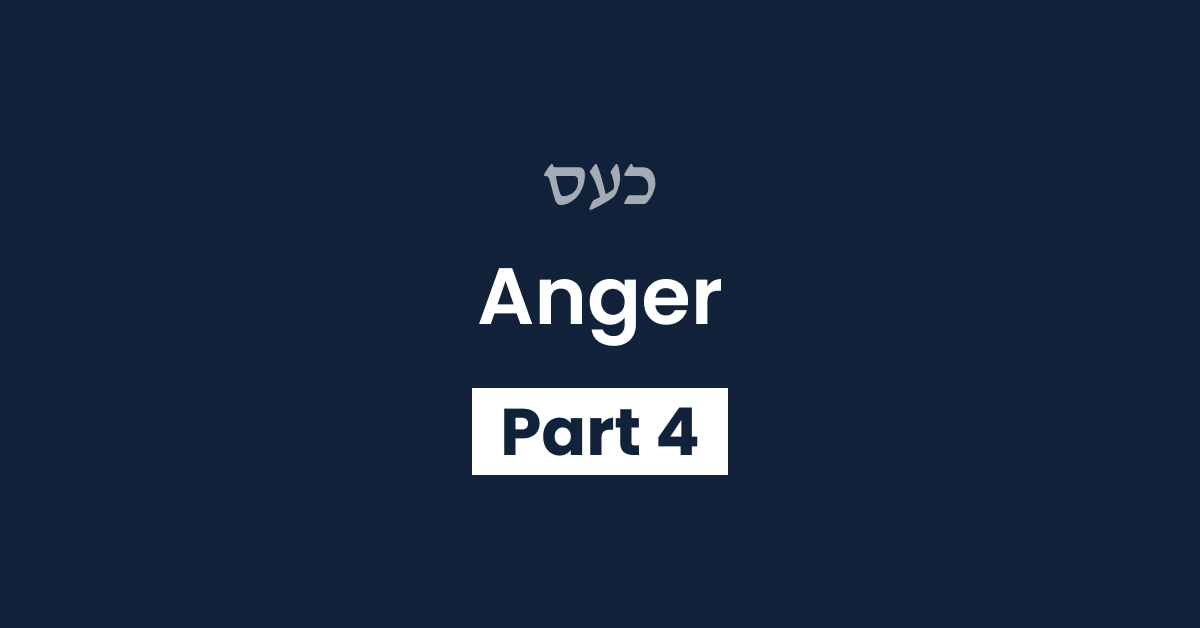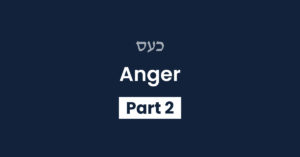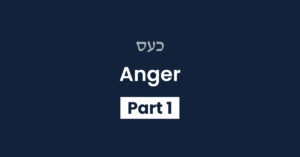Over the past few weeks, we have discussed two ways to diminish the feeling of anger: (1) force yourself to speak in a calm tone of voice; and (2) try to see the situation from the other person’s perspective. Both of these techniques can be used once we’re already feeling angry, to help prevent our anger from blowing out of proportion.
But instead of trying to restrain our anger, wouldn’t it be great if there was a way to prevent feeling angry in the first place? How can we uproot the underlying cause of anger?
The Root of Anger
The Sifsei Chaim1 explains that anger really stems from a lack of Bitachon (trust) in Hashem.
Anger really stems from a lack of Bitachon (trust) in Hashem.
Bitachon means understanding every single thing happens in this world ONLY because Hashem wants it to happen. Nothing can happen unless Hashem wants it to happen. If a person would truly integrate this understanding into his heart, then such a person would never get angry at other people.
When someone steps on my toe, my natural instinct is to yell, “Ow! Watch where you’re going!” and maybe even think to myself, “What a careless person! I’m so mad at him for hurting me!” But the truth is that nothing can happen to me unless Hashem wants it to happen. If someone steps on my toe, then it means Hashem decided that my toe should be in pain right now. As Chazal say, “A person does not injure his finger down here [in this world] unless it was decreed from Above.”2 No one can hurt you unless Hashem allows them to hurt you.
No one can hurt you unless Hashem allows them to hurt you.
This concept can be applied to the hypothetical scenario we discussed a few weeks ago, about when Ilana forgot to buy the coffee. On a superficial level, it seems as if it’s all Ilana’s fault that there’s no coffee left in the house. If Ilana would have just been more responsible and less forgetful, then you would have had your coffee. But Chazal teach us that this is not true. If there was no more coffee left in the house, then it means that Hashem decided there shouldn’t be any coffee left – regardless of what Ilana herself may have chosen to do.
Although it may seem like certain people are choosing to hurt you, or that it’s their own carelessness that’s causing you pain, the truth is that people have no power of their own. Every person is just a messenger of Hashem to carry out what Hashem intended to happen to you anyway. If that person wouldn’t have done it to you, Hashem would have made sure that it would happen to you a different way.
Every person is just a messenger of Hashem to carry out what Hashem intended to happen to you anyway.
For example, if Ilana would have remembered to buy more coffee, Hashem might have made you run out of coffee in a different way. Perhaps you would have accidentally dropped the coffee container on the floor, and all the coffee would have spilled out. Whether you spilled the coffee on your own or whether Ilana forgot to buy more coffee – either way, Hashem wanted to make sure that there was no coffee left
Even when it seems as if human beings are the cause of our pain, we must remember that they are merely messengers of Hashem.
We see this amazing level of Bitachon exemplified by Dovid HaMelech, when there was a great rebellion and many people were against having Dovid as their king. A man named Shimi ben Geira was one of Dovid’s opponents, and at one point, Shimi started cursing Dovid and throwing rocks at him. Most people in Dovid’s position would have been appalled at Shimi’s behavior and would have yelled back at Shimi or started to attack him.
Indeed, one of Dovid’s servants – Avishai – was horrified at Shimi’s behavior, and said to Dovid: “Why should we let this dead dog (Shimi) curse my master (Dovid)? Let me go chop off his head!!”
But Dovid did not get angry. He accepted this embarrassing and uncomfortable situation as a decree from Hashem, and said to Avishai: “Shimi is cursing me because Hashem told him to curse me.”3 He did not let Avishai go chop off Shimi’s head.
Dovid realized that every amount of pain he was experiencing was actually a decree from Hashem, and Shimi was just Hashem’s messenger for delivering that pain.
But What About Free Will?
Of course, just because someone is Hashem’s messenger, it doesn’t mean they’re free of guilt! A person cannot hurt someone else and then excuse himself by saying, “It’s not my fault! I’m only hurting you because Hashem decreed you should be hurt!”
Of course that would be ridiculous. Every individual person still has free will, and has the power to make their own choices. But at the same time, Hashem masterfully orchestrates world events so that it works out that whatever is supposed to happen, happens. It’s hard for our minds to comprehend, but Chazal teach us that this is the truth. (For an in-depth discussion on this topic, click here or see Rambam Hilchos Teshuva 6:5.)
Whenever people choose to hurt us, it’s their own choice, and they are held responsible for their actions. But their choices are none of our business. It’s their own personal business between them and Hashem. Our job is just to remember that this pain is coming from Hashem, and this person is just Hashem’s messenger. If this person would have chosen not to hurt me, Hashem would have sent me the pain in a different way.
Our job is just to remember that this pain is coming from Hashem, and this person is just Hashem’s messenger.
Accepting the Discomfort
Admittedly, this concept is tough to swallow. Does Hashem really want me to be in pain? Does Hashem really want someone to step on my toe? Does Hashem really want me to be missing my coffee?
These are all great questions. It’s very hard to accept that Hashem sometimes wants us to experience pain.
We will never fully understand why Hashem chooses to make certain things happen in this world, but we can rest assured that Hashem always has a good reason for everything He does. There are numerous reasons why we might need to experience pain in this world: Perhaps Hashem sends us pain in order to wipe away our sins. Perhaps Hashem sends us pain to wake us up and motivate us to do teshuva. Perhaps Hashem puts us through difficult circumstances so that we will come out as stronger people.
We’ll never truly know why any single event occurs in this world, but we do know for sure that Hashem only wants what’s best for us, and He always knows what He’s doing.
This week, let’s try to remind ourselves that everything comes from Hashem. When I experience pain it come from Hashem, and when I experience joy it it comes from Hashem. Everything ultimately comes from Hashem, so instead of becoming angry at someone for how their actions have affected me, I can remember that he/she was just Hashem’s messenger. If Hashem decided that this should happen to me, then He must have a very good reason for doing it.
Sources: [1] Sifsei Chaim Middos V’Avodas Hashem, Vol. I. pg. 257; [2] Chullin 7b; [3] Shmuel II 16:10
Your Challenge
Once a day, notice 1 way that you were affected by another person – either positively or negatively – and say: “Hashem, I know this really came from You.”
Ideally, try to say this in situations where you felt hurt, but you can also do it with positive experiences as well.
FOR EXAMPLE:
- I just slipped on some spilled water on the floor, and hurt my back! I can’t believe someone spilled water on the floor and didn’t clean it up!! But I know, Hashem, that if I slipped, You must have wanted me to slip. I don’t understand why You wanted me to slip, but I trust that You must have a good reason for it.
- I’m eating an apple that came from the supermarket, which bought it from a farmer. Even though it seems like the farmer grew this apple, I know, Hashem, that really this apple was created by You and I only have it because You wanted me to enjoy it.
- I am in a rush but I’m stuck driving behind a car that’s going so slowly. Even though it seems like I am stuck driving slowly because the person in front of me is driving so slowly, I know, Hashem, that it must be that You wanted me to be in this situation.
Torah Questions
- When Yaakov Avinu blessed his sons and pointed out each of their unique qualities, which 2 tribes did he mention as having the quality of anger? (See Bereishis 49)
- When did these 2 sons demonstrate their anger? (See Bereishis 34)
- The Gemara says that when a Chacham (wise person) gets angry, he loses his wisdom. What piece of knowledge did Moshe forget as a result of his anger? (See Rashi on Bamidbar 31:21)
- According to Devarim 32:19-20, what does Hashem say He will do if the Jewish people anger Him?
- Pirkei Avos 5:2 writes that every generation angered Hashem until a certain person entered the world. Who was that person?
- According to the Gemara (Nedarim 22a), what rules over a person who is angry?
- The Gemara (Kiddushin 71a) says that Hashem’s 42-letter Name is only taught to someone who does not get angry, and has certain other qualities. Name at least 1 of the other qualities.
- Fill in the blank: “As long as ____ are in the world, Hashem’s anger is in the world.” (Sanhedrin 111b)
Questions to Ponder
- It says in Koheles (1:18) that with more wisdom comes more anger. What do you think that means? Wouldn’t you think that more wisdom is a good thing?
- Pirkei Avos says that when a person is angry, you should not try to appease him. Why not?
- The Gemara (Sotah 41b) says that people who flatter other people bring anger into the world. What do you think that means? Why is it so bad to flatter other people?
- The Midrash writes that Yitzchok’s eyes became dimmed when he was older, because anger takes away light. What was Yitzchok so angry about? And why do you think anger takes away light from a person’s eyes more than affecting any other part of the body?




